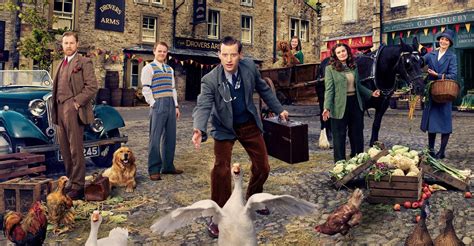As I noted last February in my review of the new All Creatures Great and Small on PBS Masterpiece, the series’ writers had a bad habit of sacrificing James Herriot’s humor (in the books and the earlier series based on them) to melodrama. Actually, it was more than a habit; it was an obsession. Now that the second season has aired ended, it’s fair to ask whether the writers have learned their lesson and, just as an experiment, read Herriot instead of relying on a summary from, say, Cliff Notes, filling in the details as they pleased.
The answer is a flat no. Who would have expected otherwise since the series has been a success? If you go to IMDB, you’ll find the viewers give the program an 8.6 rating (compared to an 8.4 for the original, immensely superior series). The critics at Rotten Tomatoes rate it 97% favorable (with visitors at the site giving it 81%). “With a winsome cast, picturesque setting, and plenty of heart, All Creatures Great and Small is a gentle reminder that good drama can be as soothing as it is entertaining,” coos the site. For season 2 the old adage applies: If it ain’t broke, don’t fix it.
But it needs fixing. For those who didn’t see it, season one’s last episode had Helen (Rachel Shenton) engaged not to James (Nicholas Ralph) but to the rich Hugh Hulton (Matthew Lewis), a character completely absent from Herriot’s books. But that’s not all. She then leaves him at the altar forlorn. How’s that for “plenty of heart”? The development has the advantage of allowing he writers to follow Herriot’s books to some degree: Helen is free to marry James, a romance that season two will develop as a centerpiece.
But that plot must compete with various subplots, among them one that (spoiler ahead!) ranks as one of the stupidest examples of writing imaginable. Those who know the books and the series from the late seventies will remember that Tristan (then Peter Davidson; now Callum Woodhouse) failed his qualifying exams for the Royal College of Veterinary Surgeons (R.C.V.S.) with alarming regularity. Each time he did, Siegfried flew into a titanic rage, calling him a boozer, a wastrel, a womanizer, and worse, and then telling him to get out. Somehow it never failed to be funny.
Ah, but the writers of All Creatures 2021-22 find such a plot line unworthy of the small screen. What do they substitute? Pay close attention. As he habitually did, Tristan is waiting anxiously for the results by mail of his latest attempt to pass. Siegfried (Samuel West) surreptitiously intercepts the letter, which predictably informs the intended recipient of yet another failure. He then replaces it with a report of unqualified success: Tristan has passed! Siegfried alone knows the truth.
Why would anyone in his right mind pull such a lamebrained stunt? The reason (and I use the noun loosely) emerges when Mrs. Hall (Anna Madeley) proudly shows Siegfried a leather valise she’s bought for Tristan’s impending birthday, inscribed with “Tristan Farnon, R.C.V.S” Siegfried must own up but not without attempting to justify himself. Tristan, he explains, needs experience in the field, which is true, but, he adds, keeping him around will allow him to, what’s one to say, bond more closely with little brother.
Tristan is now tooling around the Yorkshire countryside, making calls, and unwittingly misrepresenting himself as a fully qualified vet, something James assumes is true as does everybody else, apart from Siegfried and Mrs. Hall. The other shoe drops at Tristan’s birthday celebration. The principals are all there, with the addition of Margot Saunders (Jessica Clark), a rich beauty whom Tristan fancies but whose prime goal is to snipe at Helen for jilting Hugh; also present is Diana Brompton (Dorothy Atkinson), Siegfried’s apparent love interest. As anyone might have guessed, Tristan waxes a bit too eloquently and arrogantly about his exploits as a newly-qualified vet, and Siegfried angrily reveals the truth. The next time we see Tristan—keep in mind, this is the most broadly comic figure in Herriot’s books—he has tears trickling down his face as he drinks away his sorrow.
Where’s the hilarity in that? You’ll sift the script to find it, and so it is with episode after episode. And, okay, I’ve watched it all, but always with the nagging feeling that it has fallen far below what it might have been. In the meantime, I’m searching the ice box for my own real rotten tomatoes.
